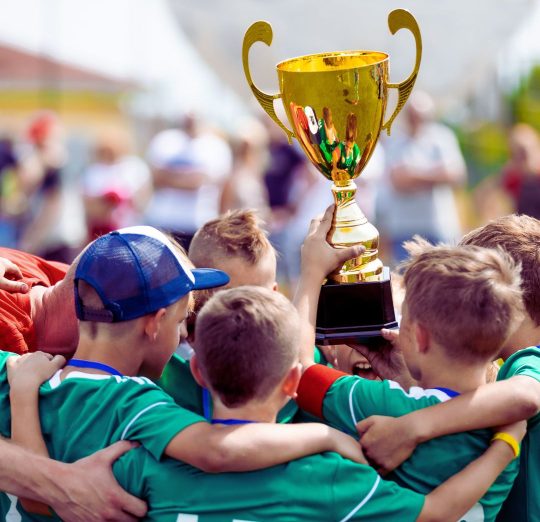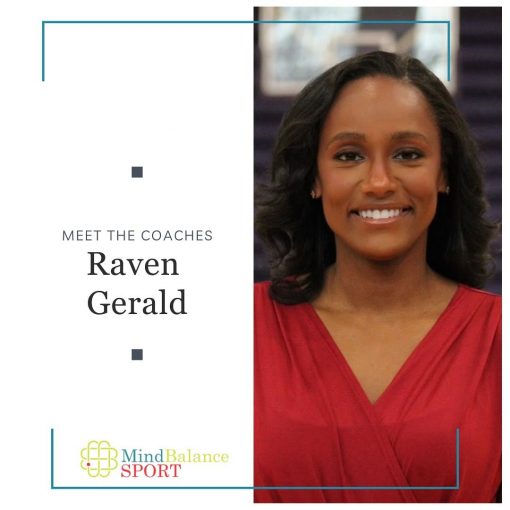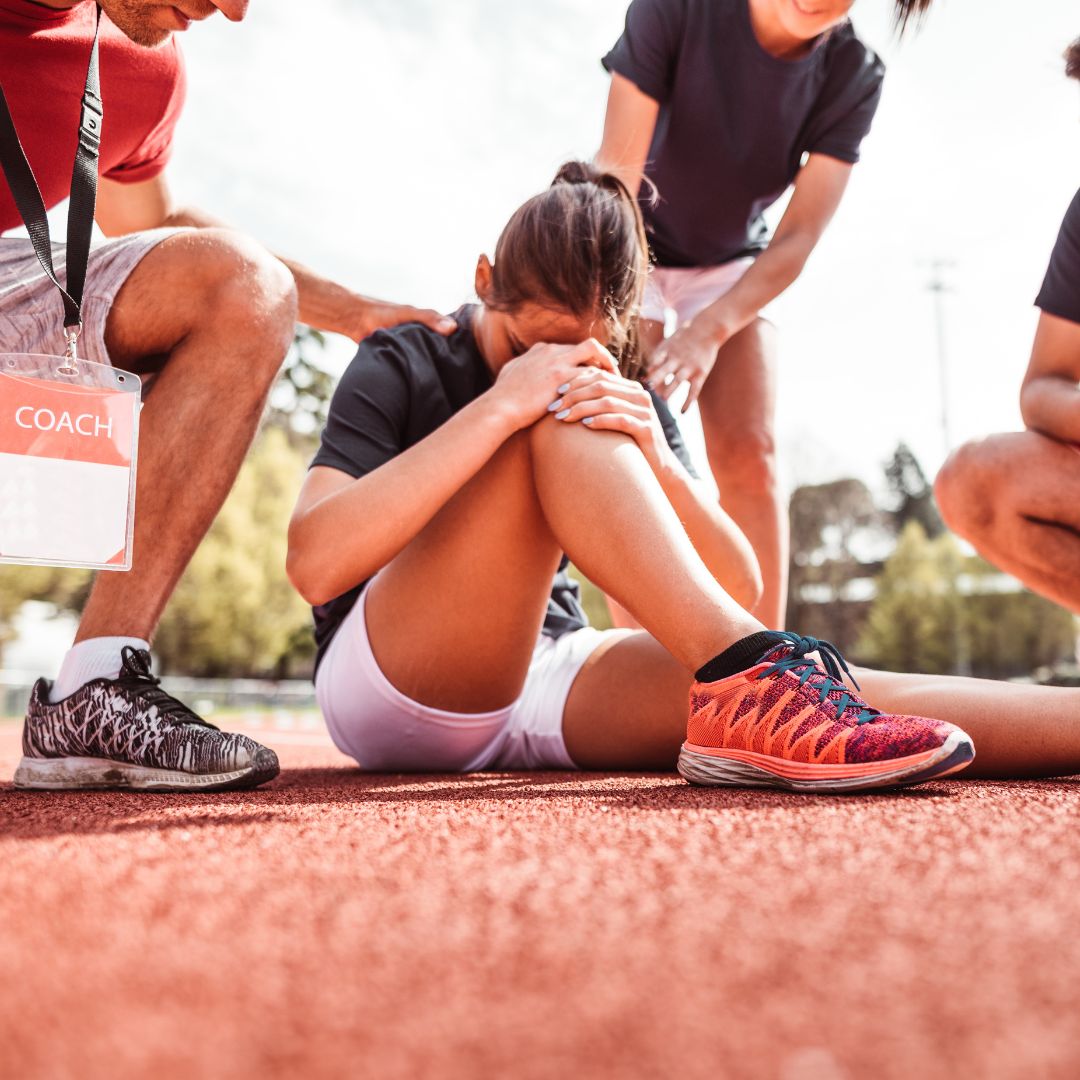Sports Psychologist in Woodbridge, VA
You want to work on your mental game, but how do you train your brain?
At MindBalanceSPORT, We Train The Other Half Of The Athlete.
You want to work on your mental game, but how do you train your brain?
Mental training does not get much media attention, but at MindBalanceSPORT we know it is a game changer. The mental skills you will learn at MindBalanceSPORT are generalizable in the classroom, in sport and in life!
We know that mental skills can be successfully taught, even at an early age.

Our Services
Meet the Team





testimonials
Athlete Stories: Real Comebacks, Real Results

Emma, a high school basketball player, tore her ACL in the middle of her junior season. After surgery, she struggled with self-doubt and fear every time she stepped back on the court. Through sport psychology training, she learned visualization techniques and confidence-building exercises that helped her regain trust in her knee. When she returned for her senior season, she didn’t just play—she led her team to the playoffs.

Carlos, a soccer player, suffered a stress fracture in his foot and had to miss half of his season. Sitting out was mentally tougher than the pain itself. We worked on mental engagement strategies to keep him sharp—studying game film, setting small rehab goals, and using mental imagery to stay ready. When he was finally cleared, his confidence never wavered.

Jordan, a track athlete, strained her hamstring before a major competition. She feared losing speed and falling behind competitors. Instead of focusing on what she couldn’t do, we redirected her energy toward mental preparation, using self-talk and goal setting to keep her confidence strong. When she returned, she set a new personal record.
EXCELLENTTrustindex verifies that the original source of the review is Google. It was a great help to my 14-year-old competitive volleyball player daughter. Raven was great to understand and connect with her from start to end. We will continue with our sessions as needed.Trustindex verifies that the original source of the review is Google. Great results! I’ve loved working with Paula. Our sessions have greatly improved both the physical and mental aspects of my tennis game. I’m playing better and having more fun! Highly recommend!Trustindex verifies that the original source of the review is Google. Our family had a wonderful experience with Paula Castro. We needed some additional confidence in a particular area/sport and Paula helped get us there. We know who to turn to if we need help again. She’s been a Blessing. Thank you, Paula!Trustindex verifies that the original source of the review is Google. I highly recommend MindBalanceSPORT. Our son works with John Howard. John is very caring, positive, and effective at working with teenagers. John is an adept listener and created an individualized plan tailored to our son’s personality. After just a few sessions with John, we noticed a significant improvement in our son’s motivation and mental approach to sports and life in general. Our son looks forward to meeting with John and tells us that he benefits immensely from their connection.Trustindex verifies that the original source of the review is Google. Paula Castro is an outstanding professional on the field. She has helped my daughter improve her confidence, preparation, and thanks to these session she feels more prepared and motivated. Paula takes the time also to share (what she can) and align with us as parents to be on the same page. Strongly recommended!Trustindex verifies that the original source of the review is Google. MineBalanceSPORT has quickly become the area's expert in sports psychology. Their reputation is well deserved given their incredibly thoughtful, scientifically based approaches to treating performance-related conditions, and I have only heard glowing, positive feedback from those who have engaged in their program. I will also add that Drs. Jones and Chirby presented to us (our group comprises of 15+ doctors and masters level clinicans) about their program and impressed us all with their level of expertise and passion for this field. I give them my highest recommendation.Trustindex verifies that the original source of the review is Google. Dr. Jones was beyond helpful to me throughout our time together. If you are an athlete and you need advice or assistance this is the place to come to. She completely changed my outlook and mindset in a time when I needed her most. I look forward to staying in touch with her and am forever thankful for her expertise.Trustindex verifies that the original source of the review is Google. Paula has been a huge help with my daughter Morgan coming off her injury. It’s been 18 months since she’s played basketball and she’s thriving because I know Paula is guiding her the right direction. As a mother, I’m extremely gratefulTrustindex verifies that the original source of the review is Google. If you are looking for Amazing Psychologists who can help support you in your sports performance, you need to call MindBalanceSPORT! Dr. Chirby and her colleagues are a wealth of knowledge, they have so many helpful techniques for mind balance, and they have so much compassion for the communities that they serve! Highly recommend!!!
Recovery
While Everyone Has A Physical Ceiling, There Is No Mental Ceiling.
How Sports Counselling in Woodbridge, VA Enhances Athletic Performance
How Sports Counselling in Woodbridge, VA Enhances Athletic Performance
A sports psychologist plays a critical role in helping athletes optimize their mental and emotional states to unlock peak performance. While physical training and skill-building are essential in sports, an athlete’s mental readiness often serves as the differentiator between success and failure during critical moments. Here is an overview of what sports psychologists do to enhance athletic performance.
Developing Mental Skills for Competition
- Goal Setting: Assisting athletes in setting realistic, measurable goals that align with their long-term aspirations.
- Visualization Techniques: Teaching athletes how to mentally rehearse performances or visualize achieving their goals to reduce anxiety and improve confidence.
- Concentration Improvement: Helping individuals block out distractions during practice or competition by cultivating mindfulness techniques.
- Stress Management: Providing tools for managing nerves, pre-game anxiety, or high-stakes moments effectively.
Supporting Emotional Regulation
- Recognizing triggers for stress or frustration.
- Developing coping mechanisms for setbacks like injuries or losses.
- Encouraging positive self-talk to replace negative thought patterns.
By fostering emotional resilience, athletes can maintain focus amidst competitive pressure.
Enhancing Team Dynamics
- Facilitating open communication within teams.
- Mediating conflicts that may arise during high-pressure competitions.
- Encouraging collective goal alignment among players.
Through improved team cohesion, athletes can perform more effectively as part of a unit.
Building Confidence Under Pressure
- Positive Reinforcement: Providing encouragement while highlighting past successes as evidence of capability.
- Mental Reframing: Shifting perspectives around mistakes, encouraging learning opportunities instead of focusing on failure.
- Routine Development: Establishing pre-performance routines that foster consistency and confidence.
| Area of Focus | Examples of Interventions |
| Mental Skills Training | Visualization, concentration exercises |
| Emotional Regulation Support | Stress management techniques, positive self-talk |
| Team Dynamics Enhancement | Communication workshops, conflict resolution strategies |
| Confidence Building Strategies | Positive reinforcement, mental reframing practices |
Promoting Long-Term Athlete Development
Beyond immediate performance improvements, sports psychologists aim to empower athletes with lifelong skills that translate into their post-athletic careers or personal lives. These professionals encourage habits such as consistent journaling for self-reflection or developing time-management systems that prioritize both athletic goals and personal well-being.
By addressing both short-term objectives and long-term growth opportunities, sports psychologists create a foundation for sustained success across all aspects of an athlete’s life.
Tailored Mental Training Strategies by Sports Psychologists in Woodbridge, VA
Sports psychologists play a critical role in helping athletes optimize their mental performance. A foundational aspect of this work involves creating personalized mental training strategies tailored to the individual needs of each athlete. These strategies are designed to enhance focus, resilience, and emotional regulation while addressing specific challenges athletes may face in their sports journey.
Exploring Performance Psychology in Woodbridge, VA Through Individualized Approaches
- The athlete’s sport: Different sports require diverse mental skills (e.g., endurance for marathon runners versus quick decision-making for basketball players).
- Performance goals: Goals might include improving concentration during high-pressure moments or managing pre-competition anxiety.
- Personality traits: Introverted athletes may benefit from reflective techniques, while extroverts might thrive on team-based exercises.
- Current challenges: Targeting areas such as confidence-building, coping with injuries, or overcoming performance slumps.
By tailoring methods to the individual athlete’s profile and aspirations, sports psychologists provide tools that resonate more effectively.
Enhance Your Skills with Sport Performance Training in Woodbridge, VA
- Short-term goals to measure immediate progress.
- Long-term goals aligned with career objectives or milestones.
- Athletes mentally rehearse their performance using vivid imagery to prepare for competition scenarios.
- Helps improve muscle memory and reduce anxiety.
- Replacing negative self-talk (“I’m going to fail”) with positive affirmations (“I’ve trained well and can handle this”).
- Encourages confidence and reduces self-doubt.
- Mindfulness meditation to stay present-focused.
- Progressive muscle relaxation (PMR) to release tension before events.
- Exercises designed to sharpen concentration during key moments.
- Includes “trigger words” or cues that refocus attention quickly when distracted.
- Breathing exercises for calming nerves under pressure.
- Developing routines to establish a sense of control on game day.
Personalized Strategies from a Sports Mental Coach in Woodbridge, VA
| Component | Technique | Purpose | Example |
| Goal Setting | SMART framework | Define clear objectives | Improve serve accuracy by 10% in 3 months |
| Visualization | Pre-performance imagery | Prepare mentally for success | Visualize winning points during practice |
| Relaxation | Deep breathing exercises | Manage pre-game stress | 5 sets of box breathing before matches |
| Self-Talk | Positive affirmations | Boost confidence | Repeat mantra: “I am prepared and capable” |
| Focus | Trigger word adoption | Regain concentration quickly | Use “reset” as a mental cue after errors |
Unlocking the Benefits of Sports Psychiatry in Woodbridge, VA for Personalized Mental Training
- Enhanced confidence by addressing specific weaknesses directly.
- Improved performance consistency through better focus and emotional regulation.
- Greater resilience during setbacks such as injuries or defeats.
- Stronger intrinsic motivation by aligning methods with personal values and aspirations.
By focusing on personalization, sports psychologists equip athletes with practical tools that empower them both on and off the field or court. This individualized approach ensures long-term growth and fosters an environment where athletes can excel at their full potential without being hindered by psychological roadblocks.
Discover a Sports Psychologist Near Me for Personalized Mental Training Strategies
Sports psychologists play a pivotal role in designing tailored mental training strategies to help athletes achieve peak performance. Every athlete is unique, with distinct goals, strengths, and challenges. Therefore, personalized mental training strategies are essential to address individual needs and ensure that they can perform at their best under pressure.
Key Components of Personalized Mental Training
- Establishing clear, measurable, and achievable goals is foundational in sports psychology.
- Outcome Goals: Focused on results (e.g., winning a championship).
- Performance Goals: Centered on personal benchmarks (e.g., improving running speed).
- Process Goals: Concentrated on specific actions or techniques (e.g., refining shooting form).
- Athletes are guided through mental imagery exercises where they visualize themselves succeeding in their sport.
- Benefits include improved confidence and reduced anxiety before competition.
- Techniques like diaphragmatic breathing and progressive muscle relaxation help athletes stay calm under pressure.
- This is particularly useful for high-stakes scenarios like penalty kicks or free throws.
- Replacing negative thoughts with constructive affirmations fosters resilience during challenging moments.
- Example phrases include: “I am prepared,” or “I trust my training.”
- Strategies to maintain concentration despite distractions are vital in high-intensity environments.
- This may involve mindfulness practices or cue words to stay in the moment.
Steps to Develop an Effective Strategy
| Step | Description | Example |
| Initial Assessment | Evaluate the athlete’s strengths, weaknesses, and mental barriers | Conducting interviews and using psychological tests |
| Identifying Areas of Growth | Pinpoint specific issues affecting performance | Managing pre-game anxiety or improving focus |
| Strategy Development | Design a tailored plan based on the athlete’s needs | Combining relaxation techniques with goal-setting |
| Implementation | Work collaboratively on integrating strategies into daily practice | Practicing visualization before every game |
| Ongoing Evaluation | Monitor progress and adjust strategies as needed | Reviewing performance metrics after competitions |
Benefits of Personalized Mental Training
- Improved ability to handle stress during key moments.
- Enhanced self-belief through consistent reinforcement techniques.
- Greater focus during critical phases of competition.
- Stronger alignment between physical abilities and mental readiness.
By leveraging these strategies consistently, athletes are not only able to optimize their immediate performance but also build long-lasting skills that benefit them throughout their careers.
Providing Accountability and Motivation Through Sports Psychology
Sports psychologists play a vital role in helping athletes maintain accountability and motivation throughout their training and performances. By offering structured support, they enable athletes to stay disciplined, focused, and driven as they pursue their goals. Below is a closer look at the strategies used by sports psychologists to enhance accountability and bolster motivation.
Establishing Clear Goals
One of the first steps a sports psychologist takes is helping athletes set clear, measurable, and achievable goals. These goals act as a roadmap for progress while keeping the athlete accountable for reaching specific milestones.
Key principles of effective goal-setting include:
– Specificity: Goals should be focused (e.g., “improve free-throw accuracy by 10% in three months”).
– Measurability: Objectives should have quantifiable markers to track success over time.
– Attainability: Goals must be realistic based on the athlete’s current skill level and resources.
– Relevance: Each objective should align with the athlete’s broader aspirations in their sport.
– Time-Bound: A timeline should be established for when each goal will be completed.
Developing Accountability Mechanisms
- Athletes are encouraged to log daily reflections on their training sessions, competitions, or practices.
- Tracking improvements helps identify progress while pinpointing areas for growth.
- Weekly or biweekly sessions allow sports psychologists to review the athlete’s short-term achievements.
- Discussions provide opportunities to adjust strategies or address any challenges encountered during training.
- Coaches, trainers, and teammates can contribute insights about consistency and effort.
- Gathering external perspectives complements self-assessment by highlighting blind spots.
Enhancing Motivation Through Psychology
- Encouraging athletes to imagine themselves succeeding helps instill confidence.
- Mental imagery strengthens emotional connections between effort and reward.
- Recognizing progress—whether small or significant—helps sustain engagement over time.
- Rewards-based systems can provide additional extrinsic encouragement.
- Guiding athletes toward adopting constructive internal dialogue helps combat negative thoughts that may hinder performance.
- Examples include replacing “I’ll never succeed” with “I am improving steadily.”
- Helping athletes reframe failures as opportunities for growth ensures they remain motivated during challenging moments.
| Motivation Technique | Purpose | Example |
| Visualization | Build confidence & focus | Imagining winning before competition |
| Positive Reinforcement | Sustain engagement | Celebrating progress |
| Self-Talk Training | Cultivate constructive mental habits | Replacing doubt with affirmations |
| Resilience-Building | Maintain long-term motivation | Viewing setbacks as lessons rather than obstacles |
By combining tailored accountability structures with proven motivational techniques, sports psychologists ensure that athletes thrive both mentally and physically in competitive environments while striving toward long-term success in their respective disciplines.
Offering Constructive Feedback to Improve Mental Toughness in Sports
Constructive feedback is a cornerstone of sports psychology, offering athletes the insights and tools they need to strengthen their mental toughness. By addressing both strengths and areas for improvement, sports psychologists help athletes build resilience and maintain focus under pressure. Effective feedback is not only about identifying weaknesses; it’s also about fostering growth and enhancing overall performance.
Key Principles of Constructive Feedback
- Specificity: Vague comments are unhelpful. Feedback should be detailed, addressing specific behaviors or actions that require adjustment.
- Timeliness: Feedback is most effective when it is given soon after the behavior occurs, allowing athletes to connect their actions with the outcomes.
- Balance: It’s important to balance positive reinforcement with areas for improvement, avoiding an overly critical tone.
- Actionable Suggestions: Athletes should leave with clear strategies or steps for improvement rather than just a list of issues.
- Focus on Effort Over Innate Talent: Reinforcing the value of effort encourages a growth mindset and helps athletes persist through challenges.
Examples of Feedback in Action
| Scenario | Ineffective Feedback | Constructive Feedback |
| A sprinter misses their personal best time by milliseconds | “You need to run faster.” | “Your start out of the blocks was strong, but adjusting your stride length may improve your pace.” |
| A basketball player hesitates during crucial free throws | “Stop choking under pressure.” | “Let’s work on controlled breathing techniques before each throw to reduce tension.” |
| A tennis player struggles with returning powerful serves | “You’re not focused enough on defense.” | “Try positioning yourself slightly farther back during serves to give yourself more reaction time.” |
Benefits of Constructive Feedback on Mental Toughness
- Improved Self-Awareness
Receiving specific insights allows athletes to recognize patterns in their behavior and performance. - Enhanced Focus Under Pressure
Addressing areas such as decision-making or emotional regulation equips athletes to stay composed in high-stakes situations. - Greater Confidence and Motivation
Balanced feedback that acknowledges effort helps reinforce an athlete’s belief in their abilities while motivating continued progress. - Strengthened Resilience Through Challenges
Constructive criticism fosters adaptability and teaches athletes how to bounce back from setbacks effectively.
Techniques Used by Sports Psychologists
- Video Analysis: Reviewing footage allows athletes to observe their performance objectively alongside expert input from the psychologist.
- Self-Evaluation Exercises: Encouraging athletes to assess themselves can complement external feedback by promoting self-reflection.
- Goal Setting Frameworks: Using SMART (Specific, Measurable, Achievable, Relevant, Time-bound) goals helps translate broad feedback into actionable targets.
- Role-Playing Scenarios: Simulating high-pressure situations provides an opportunity for immediate application of feedback strategies.
Incorporating these approaches ensures that feedback isn’t only useful but also transformative for long-term development as an athlete.
Fostering Self-Reflection to Build Confidence and Resilience in Athletes
Self-reflection is a critical component of personal growth for athletes, and sports psychologists play a fundamental role in fostering this practice. By encouraging athletes to analyze their thoughts, emotions, and behaviors, sports psychologists help them develop the confidence and resilience required to perform at their best. This process not only strengthens mental fortitude but also equips athletes with tools to handle setbacks effectively.
The Importance of Self-Reflection for Athletes
- Identify Strengths and Weaknesses: Understanding areas of proficiency and improvement is key for targeted development.
- Process Emotional Experiences: Reflecting on successes or failures helps athletes regulate emotions more effectively.
- Enhance Decision-Making Skills: Reviewing past decisions provides insight into making better choices under pressure.
- Set Realistic Goals: Introspection can help athletes align their goals with their abilities.
By dedicating time to self-reflection, athletes gain clarity about their performances and mental state, which is essential for long-term development.
Techniques Used by Sports Psychologists to Encourage Self-Reflection
- Encouraging athletes to maintain a daily or weekly performance journal helps them track progress, identify patterns, and recognize areas requiring change.
- What went well today?
- What challenges did I face?
- How did I respond emotionally during high-stress moments?
- Facilitating discussions after games or training sessions allows athletes to dissect their performances objectively.
- Video analysis can be incorporated alongside verbal reflections for deeper insights.
- What thought processes helped you stay focused during competition?
- How did you react when things didn’t go as planned?
- What would you do differently next time?
- Mindfulness Exercises
Engaging in mindfulness practices fosters self-awareness by helping athletes connect with their inner thoughts without judgment.
Benefits of Building Confidence Through Reflection
| Benefit | Explanation |
| Improved Focus | Reflection clarifies priorities, allowing athletes to concentrate on key goals. |
| Reduced Performance Anxiety | Identifying triggers through reflection reduces uncertainty during competition. |
| Enhanced Problem-Solving Skills | Evaluating past actions fosters adaptability in challenging situations. |
| Greater Sense of Achievement | Recognizing progress builds self-belief over time. |
Cultivating Resilience Through Mental Frameworks
- Reframe failures as learning opportunities.
- Develop coping mechanisms for stress or fatigue.
- Build an internal narrative of perseverance.
For instance, when an athlete reviews a poor performance constructively rather than critically, they are more likely to approach the next challenge with renewed determination instead of dwelling on past mistakes.
By integrating structured self-reflection practices into an athlete’s routine, sports psychologists empower them not just to excel in the moment but also sustain peak mental health throughout their careers.








